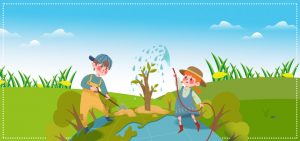The second part of responsibility addresses the question:
To what do we respond?
We respond:
To the self:
 I respond to myself through setting standards of my real self and my ideal self. My level of self-awareness constantly tells me who I am, including my strengths and limitations in all the faculties discussed prior. It also keeps ringing within me, who I ought to be. The more congruent the two are (real self & ideal self), the more I experience inner harmony. The thoughts I nurture within me are also important. Those that generate and nurture negative thoughts (also called negative self-talk), are more tilted towards self-hate, despise, conflict and increased mal-functioning. The opposites of the expressed are true of those that nurture positive thoughts. Continued growth in the areas of self-awareness, self-acceptance (including constant self-forgiveness), and self-actualization are not an option for any one that desires growth.
I respond to myself through setting standards of my real self and my ideal self. My level of self-awareness constantly tells me who I am, including my strengths and limitations in all the faculties discussed prior. It also keeps ringing within me, who I ought to be. The more congruent the two are (real self & ideal self), the more I experience inner harmony. The thoughts I nurture within me are also important. Those that generate and nurture negative thoughts (also called negative self-talk), are more tilted towards self-hate, despise, conflict and increased mal-functioning. The opposites of the expressed are true of those that nurture positive thoughts. Continued growth in the areas of self-awareness, self-acceptance (including constant self-forgiveness), and self-actualization are not an option for any one that desires growth.
To the significant others:
“No man is an island entire of itself; every man is a piece of the continent”
(Donne, J. (17th C). Meditation XVII- Devotions upon Emergent Occasions. https://web.cs.dal.ca/~johnston/poetry/island.html). This is linked to the African Philosophy of Ubuntu, “I am therefore/because we are” associated with African philosophers among them J. S. Mbiti.
 Apart from notably the Cat family that lives in solitude, species of carnivores and herbivores, as well as insects derive survival strength from being together.
Apart from notably the Cat family that lives in solitude, species of carnivores and herbivores, as well as insects derive survival strength from being together.
This extends the earlier saying of “no man is an island”, to include the reality that the human being derives sustenance other human beings. We therefore respond to these others.
To the environment:
Not only does the human person derive sustenance from other human beings, but is part of the larger habitat. Food chains show how what animal feeds from what and in turn is preyed upon by what.

The human person, depends largely on this system. He breathes in oxygen that is produced by plants that in-turn take in the carbon dioxide. The 2004 Nobel Lureate Wangari Maathai’s statement “Nature is very generous but very unforgiving, if you destroy Nature, Nature will destroy you”, can never be more true. We have a duty to respond positively to the environment.
Responsibility therefore, entails how we use our ability to respond to any of the discussed recipients.
Well-thought and considerate response generates sustainability and stewardship towards self, others and the environment.
Indeed when that is done, we are responsible.


